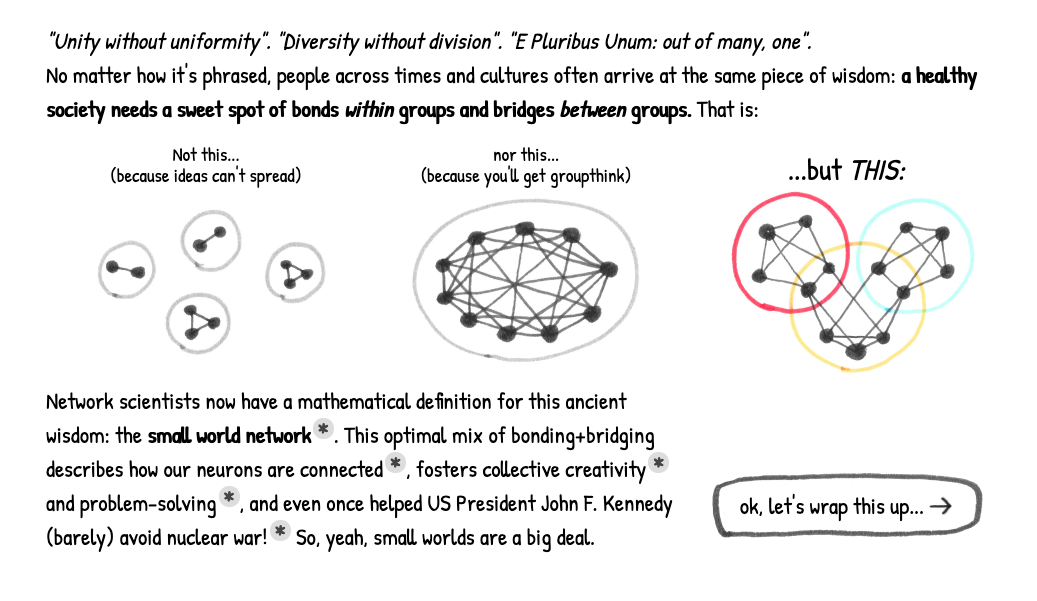Conservatism should not be the same thing as dogmatism
J. Hathaway
- 5 minutes read - 955 wordsA dogma will thrive in soil where the truth could not get root.
The Old Testament is full of family-based small networks as examples of both the good and the bad that can come from depending on one person as the conveyor of truth. If we are not careful, we will look to the Bible’s experiences to justify letting one man tell us what the truth is at the expense of all other truth sources. If we examine the life of Christ, we will see in his example, a leader that taught using history, scripture, and logic to convey truth. He is also careful not to enforce his right at the expense of other’s agency. I appreciate the picture that I see in the gospels. How can we discern between those that speak the truth without succumbing to those that demand dogmatic devotion?1
Dogma and small networks
Human history is littered with masses believing what a few tell them to be true. In our historically small circles, these few were our parents or grandparents, which often proved successful as they had more motivation to nurture a small family unit. However, in the last 200 years, our world of influence has grown such that we can find an ’expert’ at any imaginable concept and read their views within seconds. Technology gives us access to information and truth that our grandparents could barely imagine. The downfall is that it allows individuals to isolate into small disconnected networks that lack a family network’s nurture.
Humans often don’t appear prepared to challenge small networks’ dogma with forceful purveyors of beliefs at the head. Many of us are lucky enough to be in nurturing small networks that cover many shortcomings of a forceful truth-teller and the small network. Some of us often barely recognize the influence these small networks have over our thinking and decision making. We can see the effect in the weird family across the street. But, we don’t realize that the same perception of ‘weird’ is coming from their house to us.
As I shared in a previous post, we are cursed and blessed by depending on our networks to inform us of truth. I shared that ‘I believe that God’s truths thrive in the small world networks shown on the right. A network where members of different faiths, parties, or families interact to refine their thinking and understanding around truth.’

Dogma and The Church of Jesus Christ of Latter-day Saints
I stated that the most prominent difference in sentiment between the Latter-day Saints and sectarians was, that the latter were all circumscribed by some peculiar creed, which deprived its members the privilege of believing anything not contained therein, whereas the Latter-day Saints have no creed, but are ready to believe all true principles that exist, as they are made manifest from time to time.
Joseph Smith History of The Church
Joseph struggled with dogma throughout his life. The above quote shows Joseph pushing against dogmas. Finding this balance was a struggle in his life and is a struggle in most of our lives. While he understood the problems of groups that tenaciously held to creeds, he established our faith with truth to move it forward. In addition, he also had to deal with the tension in his trust of older, experienced men (E.g., Martin Harris, Joseph Smith Snr., Oliver Cowdery, Syndey Rigdon, John Bennet). Some brought excellent guidance to his life, and others proved not to be as nurturing. While different than our time, Joseph had to trust experts even as a prophet. A few posts ago, I asked, Can we know anything? In that post, I argued that we have to depend on others for knowledge when I said ‘We can’t worship experts, but we can’t throw them under a bus either. Both extremes are fraught with problems, and there should be some balance.’
How do we verify the dogma shared with us?
Wikipedia provides some valuable insights into dogma;
- Dogma in the broad sense is any belief held unquestioningly and with undefended certainty.
- In the pejorative sense, dogma refers to enforced decisions, such as those of aggressive political interests or authorities.
- Dogma is applied to some strong belief which its adherents are not willing to discuss rationally.
Regardless of the virtue of our purveyor of truth, we need to find ways to question our leaders and allow ourselves to exist in a degree of uncertainty. If we ever feel a family member, church leader, or civil leader enforce one view absent rational argument and real evidence, we should put an asterisk next to that point or purpose.
Dogma is not revelation. Opinion is not science. Religion is not politics. The Jews in Jesus’ time forgot this, and it looks like many Latter-day Saints and Evangelicals have been lead astray in our day. If I can remix Ralph Waldo Emerson,
A foolish [consistent devotion] is the hobgoblin of little minds, [worshiped] by little statesmen and philosophers and divines. With [consistent devition] a great soul has simply nothing [to ponder]. He may as well concern himself with his shadow on the wall.
If we are isolated in groupthink, how do we create healthy small world networks in our own lives? I think the details are different for each person, but it almost always starts by finding the truth and insight that we can glean from another group outside our own circle.
-
Lemuel K. Washburn shared this quote. He was an atheist and thought the bible was dogma. I would be an athiest as well, based on his assumptions about God and the Bible (which I don’t hold). I like his quote and some of his arguments. But I don’t like how he applied this quote. https://infidels.org/library/historical/lemuel_washburn/bible_worth_reading.html ↩︎